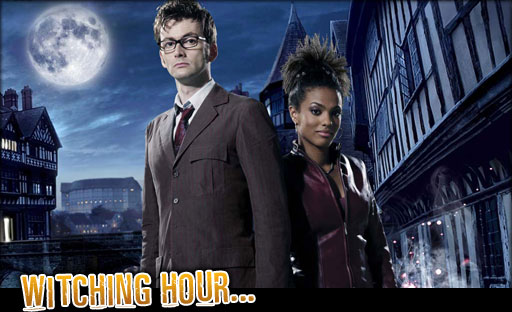
Aired 7 April 2007
‘The Shakespeare Code’ is the third of Doctor Who‘s now annual celebrity pseudo-historical stories following rather successful adventures with Charles Dickens and Queen Victoria. Even though the plot follows a rather predictable formula, the menace and viciousness of the witch-like Carrionites even before the credits roll set the scene for another fun- if ultimately forgettable- tale.
Though the setup is sound, the biggest problem with ‘The Shakespeare Code’ is that it never seems like it takes itself seriously, spending far too much time inserting popular culture references and trying to create an environment of a comedy of error. William Shakespeare himself becomes a larger-than-life presence on screen due to Dean Lennox Kelly’s energy and enthusiasm, but the script portrays Shakespeare as the type of person who is keen to ‘borrow’ lines of dialogue he happens upon rather than the shrewd linguist and playwright history knows. Presumably the more ostentatious presentation of such a famed historical figure is to add some excitement to a man in a profession that can hardly be called riveting for young viewers, but the somewhat crazed brazenness on display will surely be offputting to some. The character ultimately lacks the subtle, refined background that made the main guest characters so fascinating in the previous historical tales.
After the successful setup in which the mysterious Carrionites rip apart a young man who has fallen in love with one of their numbers, the power and might of this ancient race is never really explored again. Instead, the script relegates them to the role of cliched witches, often seen together cackling and making extremely overblown threats. Amanda Lawrence as Doomfinger, Linda Clark as Bloodtide, and Christina Cole as Lilith do with the roles what they can, but the shrieking and incessant rambling do little to convey a further sense of menace, and even Lilith’s times with a normal human face offer little. They serve a purpose to move the story along, but ultimately they become a race that, as written, should stay trapped in the crystal ball they find themselves in at story’s end forever. There’s potential for greatness if the manic cliches are toned down, but this particular group should stay a one-time foe.
Unfortunately, the supporting characters do little to distinguish themselves beyond stereotypical filler roles, which would almost be forgivable except for the fact that the Doctor himself is written terribly in this story as well. Considering how taken he was with Martha’s intelligence and spunk in ‘Smith and Jones,’ he hardly cuts her a break here as he lets her know that Rose would know how to solve the problem and continues to remind her that sh’e’s only getting the one trip in the TARDIS. It just seems very out of character, even for a man who is still clearly suffering from his loss. Tennant is exceedingly strong with the material, and he has a definite spark with Freema Agyeman, but only glimpses of Martha’s innate enthusiasm are allowed to bleed through what is quickly becoming an unrequited love story.
Using Shakespeare and his missing play is a clever way to tie events together to stop the Carrionite threat, but the inclusion of Harry Potter spells and quotations at the end reeks of pandering to the modern audience. Sadly, there’s just little real tension built up throughout the story, and it seems as though there is a hidden potential for so much more than what is ultimately delivered. Still, the set design and visuals are top-notch and the running time flies by quickly enough with the pacey script; it’s simply not a script that will hold up to the test of time.


November 27, 2020
[…] Gallifreyan Ramblings; The M0vie Blog; Demons’ Run; Spiralbound Notebooks; Tapetrade; Time Lord Archives; Junkyard View; Lyratek; Random Whoness; Twilight’s Warden; Doctor Who Reviews. […]